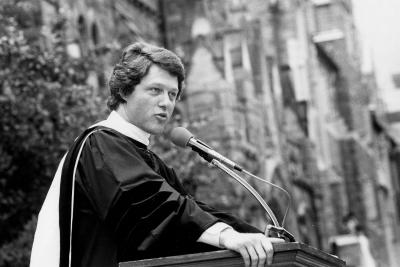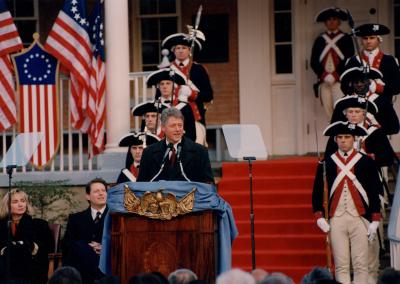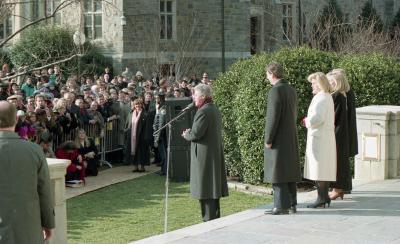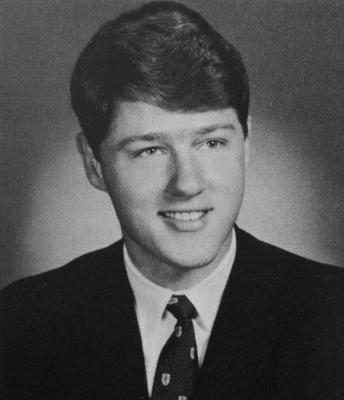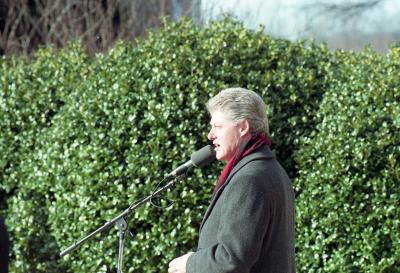Bill Clinton (SFS'68) was the 42nd president of the United States and is the most famous graduate of the School of Foreign Service.
Before Georgetown
Clinton was born on August 19, 1946, in a small town in Arkansas. He was a delegate to the American Legion Boys Nation and won the Arkansas State Elks Youth Leadership Award. Clinton was the president of his class in high school and a member of the National Honor Society. Clinton graduated Hot Springs High School in Arkansas.
Clinton's undergraduate years at Georgetown
Clinton entered Georgetown's School of Foreign Service in 1964. He was elected as president of both his Freshman and Sophomore classes while also serving as the chairman of the GU Student Athletic Commission. He was an excellent student, making the Dean's List, and became a member of political science and history honor societies.1 Outside the hilltop, Clinton worked on the staff of the Senate Foreign Relations Committee for Arkansas Senator J. William Fulbright. He was named one of "Who's Who in American Colleges and Universities." Clinton lived in Harbin Hall during his sophomore year.
When Clinton was asked who his favorite professor was in an interview in 1988, he mentioned his philosophy professor, Father Hentz. Clinton also spoke about Professor Carroll Quigley, his professor for "The History of Western Civilization," who has consistently been mentioned in Clinton's speeches. Quigley's concept of "Future preference" — the idea that once people believe that the future could be better than the present, they will sacrifice today for the sake of tomorrow — shaped a large part of his outlook on policy and even mentioned it in his acceptance speech for the Democratic party's nomination. He also recounts one of his proudest academic achievements at Georgetown to be getting an A — one of four students in a class of 240 — in a class taught by Father Cebus. 2 One incident, also mentioned in Clinton's autobiography, is of Clinton falling asleep in Professor Walter I. Giles's "U.S. Constitution and Law" class. An extremely rigorous and demanding class up to the caliber of most first-year seminars at law school, Dr. Giles is remembered as a strict but brilliant professor. During one class, Clinton fell asleep when Dr. Giles was speaking on a Supreme Court ruling that was so clearly written that it would be easily understood by most people, "unless, of course, you're from some hick town in Arkansas."3 It was only after his classmates woke him that Clinton registered the comment to be directed at him. He never fell asleep in Dr. Giles's class after that.
Clinton officially ran for president of the Student Council in March 1967. In his campaign platform, titled "A Realistic Approach to Student Government," Clinton criticized the administration and Council for being out of touch with students. Clinton wrote, "May we call this progress? Is the Council adequately expressing the student's views? Do post facto resolutions condemning tuition rises or cafeteria service or infirmary practices by themselves get things done? The answer to all these questions is No!"4 His campaign platform included the creation of club football and Metropolitical Washington Club Football Conference to boost school spirit, a University-wide used-bookstore, a Student Council Scholarship Drive, and a Student Bill of Rights.
Terry Modglin, Vice President of the junior class received 717 votes to Clinton's 147 votes.5 Once the election results came in, Clinton gave his concession speech, thanking his campaign team and wishing Modglin the best of luck. Modglin spoke about the infamous election of 1967 in a recent interview by the Washingtonian. Modglin claimed that he was the underdog candidate, while Clinton, whose reputation as the Freshman and Sophomore class president made him the establishment candidate.6
Clinton graduated from Georgetown in 1968 with a Bachelor of Science in Foreign Service degree. Since Robert Kennedy was killed just a few days before the Class of 1968's graduation, many of the traditional senior festivities were cancelled. Clinton won a Rhodes Scholarship to Oxford and became the first graduate of the School of Foreign Service to win one.
After graduation
After finishing his studies at Oxford, Clinton attended Yale Law School. After receiving his degree from Yale in 1973, he returned to Arkansas and taught law at the University of Arkansas. The following year, he married Hillary Rodham. In 1976, he was elected Arkansas attorney General, officially marking the beginning of his political career.
In 1980, Clinton, now the Governor of Arkansas — the youngest in the country for the last 40 years — returned to Georgetown to give the commencement address for the class of 1980. Here is an excerpt from his speech:
Twelve years ago when I was where you are now, our nation was torn by a war abroad; by riots and assassinations at home; inflation, though mild by today's standards, was first beginning to rear its ugly and persistent head. We were deflated by our failures in Vietnam, and by crushing of liberty in Czechoslovakia by the Soviet Union... One politician who seemed to be trying to bridge all the gaps that divided us, and formed a new majority for progressivism, Robert Kennedy, was assassinated only five days before I graduated from Georgetown in 1968.
He concluded with a remark on Georgetown students' responsibility to handle the myriad of problems that:
Georgetown is in the deepest sense, an international university... the problems we have today are still overshadowed by that virtue and what we, what you must work on today and tomorrow and for the rest of your lives, is the task of tearing down those walls that are within our own minds that limit our ability to make this country what it ought to be. It deserves our best, it deserves your best. We can make the 1980's a decade of hope and fulfillment for the American people.
Clinton presidency
The election year of 1991-1992 was a busy and exciting time for Georgetown. Clinton visited his alma mater to speak about his campaign on October 23, 1991 in an address to 600 people at Gaston Hall.7 He visited Georgetown a second time on December 12, 1991, and spoke about "A New Covenant for American Security."
In November of 1992, Clinton was elected as the 42nd president of the United States. As part of the inaugural special, Georgetown President Leo J. O'Donovan was interviewed by NBC.
Georgetown festivities celebrated the days leading up to the inauguration day of President Clinton with the "Clinton Countdown". This included special Clinton-themed merchandise at the University Bookshop and participation in the Bells for Hope.8 In support of the Bells for Hope, the Healy Bell rang from 6:00pm to 6:02pm.
Clinton also visited Georgetown on January 18, 1993 to mark his impending inauguration with a group of 200 foreign diplomats, speaking to them from Old North. In advance of Clinton's arrival, Secret Service made security sweeps of campus and restrict parking throughout the day. Clinton spoke to the Diplomatic Corps on the step of Old North with men dressed as Revolutionary-era militia, mirroring George Washington, who also gave a speech at Old North centuries ago.
After an exclusive event with diplomats and media outlets, Clinton and Gore moved to White-Gravenor to address students, alumni, and faculty for the first time since he was elected. During this event, First Lady Hillary Clinton spoke, "You don't know how much it means to my husband to return here to Georgetown." President Clinton then addressed an exuberant crowd, directly addressing students to assume responsibility for the nation's future. Here is an excerpt from his speech:
"I came (to Georgetown) at a time when a fallen president had asked my generation to give something back to our country, looking for a place to prepare for that calling. Georgetown and its School of Foreign Service have made enormous contributions to public service. Many of its graduates, including classmates of mine, are now distinguished members of the Foreign Service or the Armed Forces."9
On January 22, the College Democrats hosted an inaugural ball at the Leavey Ballroom for Georgetown faculty, students, and staff to celebrate this event.
Clinton hosted his 25th class reunion at the White House in 1993. 1,200 alumni and their spouses attended this event. The festivities began with brunch in the historic Blair House, dinner on the South Lawn, and ended with dancing to The Righteous Brothers and Chuck Berry. Alumni had the opportunity to reminiscence about their time at Georgetown and celebrate together, especially since 25 years ago, the Class of 1968 did not partake is traditional graduation festivities due to the assassination of President Kennedy. One alumnus who attended the event stated, "We may not agree on everything, but we were all shaped by the same events, and because of that, there's a lot of bonding in our class."10
Clinton returns to Georgetown
Clinton visited Georgetown multiple times during and after his presidency. On the first anniversary of his inauguration, Clinton visited Georgetown to give a speech.
Clinton has visited Georgetown for many important occasions since then. On December 1, 1993, Clinton visited several AIDS patients at Georgetown University Medical Center to commemorate World AIDS Day.11 He visited the Medical Center on August 8, 1997 to announce his $2 billion plan of research and treatment to fight diabetes.12 That same year, Clinton and Vice President Al Gore, members of his Cabinet and various science experts met at Gaston Hall to prepare their Environment-Economic policy before the Kyoto Conference.
In 1999, Clinton gave the Herbert Quandt Distinguished Lecture on "The Tenth Anniversary of the Fall of the Berlin wall and the Beginning of the Velvet Revolution." Clinton made his 13th visit to the Hilltop on September 1, 2000, to speak about controlling the spread of weapons of mass destruction.
After 9/11, Clinton returned to Gaston multiple times to speak to students in an event sponsored by the Lecture Fund and the School of Foreign Service. He consoled Georgetown students and faculty in his speech:
This is not a perfect society, but it is one stumbling in the right direction... but what gives us the freedom to celebrate our differences is the certainty of our common humanity. This is not easy to do, but I'm telling you, no terrorist campaign has ever succeeded, and this one won't if you don't give it permission. You can have the most exciting time in human history, but we have to defeat people who think they can find their redemption in our destruction...Then in the end, we've got to be able to stand up and say, we are not against Islam, but we want to have a clear understanding about what we think is the nature of truth, the value of life, and the content of community. If we do that, you will still live in the best time the world has ever known.13
On December 2, 2022, Clinton spoke as part of a distinguished panel of Georgetown alums at the School of Foreign Service Centennial Gala. He recounted an incident with the editor of his autobiographer, who demanded that Clinton take 20 pages out of his autography about his time at Georgetown — there were still 25 pages left in the final book. When his editor admonished him and said, "There is no way you remember all these people, much less what they said in class." In response, Clinton said, "Oh, yes I do... I was paying attention."14
- 1Hal, Kelly. "Clinton-Rhodes Scholar." Georgetown University News Service, Dec 19, 1967.
- 2Clinton, Bill. Interview. Conducted by Dan carpenter and Mark Johnson. Georgetown's Blue and Gray, 1988.
- 3Shapiro, T. Rees. "GU professor served up a heady mix of rigor and enthusiasm." The Washington Post. Nov 22, 2009.
- 4Clinton, Bill. "A Realistic Approach to Student Government." Mar 8, 1967.
- 5"O'Brien Takes Yard Elections: Modglin Wins in E.C. Contest." The Hoya. March 16, 1967.
- 6McNamara, Sylvie. "This Man Beat Bill Clinton for Student President of Georgetown." The Washingtonian, Oct 13, 2022. https://www.washingtonian.com/2022/10/13/this-man-beat-bill-clinton-for-student-president-of-georgetown/
- 7Amrofell, Greg. "Clinton details economic campaign strategy." The Georgetown Voice. Nov 21, 1991.
- 8"Clinton Countdown." Georgetown University. Jan 12, 1993.
- 9"Clinton Countdown." Georgetown University. Jan 19, 1993.
- 10Vest, Jason, and Roxanne Roberts. "Groovin' on the Grass: Clinton's Georgetown Class Reunites at the White House." The Washington Post, June 6, 1993.
- 11"Clinton Visits Georgetown on World AIDS Day." Georgetown University Medical Center. Jan 1994.
- 12Molotsky, Irvin. "Clinton Unveils Plan to Battle Diabetes." The New York Times. Aug 9, 1997.
- 13Clinton, Bill. "Remarks as delivered by President William Jefferson Clinton." Georgetown University. Nov 7, 2001.
- 14Clinton, Bill. Georgetown University School of Foreign Service Centennial Gala, Washington D.C., Nov 16, 2019.

